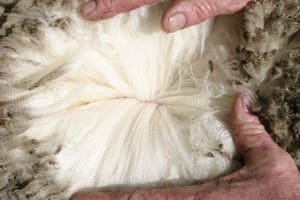 Australian woolgrowers will again have the opportunity to vote this year on how much wool levy they pay when the 6th triennial WoolPoll is held later in 2015.
Australian woolgrowers will again have the opportunity to vote this year on how much wool levy they pay when the 6th triennial WoolPoll is held later in 2015.
Under the Wool Services Privatisation Act 2000 and its Statutory Funding Agreement (SFA) with the Federal Government, Australian Wool Innovation is required to conduct an independent poll of levy payers every three years to determine the amount of levy to be collected from woolgrowers.
The result dictates the level of revenue AWI has to invest in R&D and marketing activities on behalf of woolgrowers for the ensuing three years.
Growers are typically asked to select from five levy rates, which at the last WoolPoll in 2012 ranged from 3pc of gross wool proceeds to 2.5pc, 2pc, 1pc and 0pc (that latter result would effectively shut down AWI and end all grower-funded R&D and marketing activities).
In the last vote three years ago a majority of growers supported maintaining the wool levy rate at 2pc, but with a changed expenditure mix, moving from an equal 50:50 split between marketing and R&D to a ratio of 60pc marketing/40pc R&D.
The poll has been conducted every three years since 2000. Prior to that, the process for setting the rate of the wool tax as it was then known was determined behind closed doors by the Australian Government and the Wool Council of Australia (the predecessor of WoolProducers Australia).
With another WoolPoll set for this year, Australian Wool Innovation has raised the question in its submission to the senate inquiry into agricultural levies about whether a case exists for extending the vote beyond the current three year time frame.
AWI’s submission states that before the Senate inquiry was called, it was in discussions with the Federal Government to investigate the possibility of changing the frequency of the WoolPoll from every three years to every four or five years.
It says the exercise would have required significant grower consultation, but the discussions were put on hold when the Senate inquiry into agricultural levies was called in October last year.
AWI’s submission says that while there are many benefits to woolgrowers, government and AWI in conducting the WoolPoll, there are also downsides:
“In particular, WoolPoll is a significant resource burden on AWI both from a cost perspective and staff demands.
“It could also be argued that the timeframe is too frequent.
“The three-year triennial business cycle in which AWI is required to operate also creates ongoing tension between balancing AWI’s responsiveness to its industry and government stakeholders, with its reason for being – to invest in strategic Research, Development and Marketing.
“A three year business cycle is very short and vulnerable to the winds of change which can invariably occur.
“It could be argued that a longer business cycle would be more conducive to the investment and delivery of strategic R&D.”
However the submission also makes a later point that it could be argued that if AWI’s business model was not required to conduct a poll of eligible levy payers every three years directly following its independent Review of Performance, “the motivation or catalyst for change may not be as great”.
WoolProducers Australia president Richard Halliday said the extension question was discussed around the WoolProducers board after it was floated by AWI last year.
He said it generated a lot of discussion but ultimately the argument in favour of extending the time frame lost.
Some directors were vehement WoolPoll had to be held every three years, while others saw some merit in the idea, he said.
“It is all to do with their (AWI’s) strategic planning time lines,” he said.
“On a three-year time frame, you spend 6-8 months building up the next strategic plan, selling it, getting people to understand it and putting it into place, and so then you are really only getting two years from it before you are planning your next one.”
Mr Halliday said the discussion about whether WoolPoll should be extended was really an issue that needed to be discussed by the industry as a whole.
“If industry think it is a good idea, well let AWI introduce it for industry,” he said.



HAVE YOUR SAY